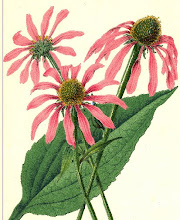
Above: Tony Cater (left) guiding the Middlesex students on their tour of Proline Botanicals.
Kerstin Falkenstein, 3rd year Herbal Medicine student at Middlesex University, gives an account of the visit:
"On Tuesday the 10th November 2009 the third year Herbal Medicine students went as part of the Herbal Therapeutics module organised by module leader Anne Stobart on an excursion to a well known manufacturer of herbal products. ‘Proline’ is a modern enterprise situated on the outskirts of Stamford in Lincolnshire. The first impressions were not exactly matching our maybe more romantic ideas of herbal manufacturing, but none of the students has ever been to a herbal supplier and so we were all in for a bit of a surprise. The staff and the director of the company Mr Tony Carter gave us a warm welcome and over tea explained the concepts and strategies of his business.
‘Proline’ is a company priding itself on very high standards of quality concerning the herbal products it provides. The herbal raw materials are audited by their in-house quality team with inspection, batch and laboratory testing of all ingredients before they can be used in any of their products. The laboratories are equipped with high standard technology in accordance with their Good Manufacturing Practice (GMP) status. Mr Carter puts particular emphasis on an excellent hygienic and clean environment in the rooms dealing with plant material ensuring the purest quality of the end products thus avoiding any cross contamination.
We got a first glimpse of this regime when Mr Carter provided us with protective hats and gowns before taking us on a tour around the place. And, indeed, pristine it was – all rooms were covered in white plastic walls, equipped with strong extractor fans and easy to clean sloping floors. We were shown pill forming machines, percolators for tinctures, analytical equipment as well as the huge packaging and storage department. The tinctures are kept in amber glass or PET bottles, which are said to prevent the leeching of xeno-estrogenic plasticisers unlike for example polyethylene containers. Concerning the tinctures ‘Proline’ favours the process of percolation over maceration because of the higher yield of active chemical constituents from the herbs, a quality issue established in vigorous laboratory testing according to Mr Carter. They offer only two types of tinctures – 1:1 and 1:3 in order to avoid confusion of varied specifications across the range, which simplifies production as well as consumer choice. Despite an obvious great investment in technical equipment and quality control measures ‘Proline’ manages to keep the prices of their products at a competitive level.
The company does have a variety of customers, supplying a number of herbal product manufacturers in the UK which then sell these products under their own label like ‘Neals Yard Remedies’ or ‘Napiers’, but also providing service for small herbal businesses and lone practitioners. They also export their products to countries like Iceland, Norway, Sweden and Denmark.
Although, this company does herbal manufacturing on an industrial scale, the advantages concerning quality control and high standards of end products are obvious and in accordance with consumer expectations. With the process of regulation growing increasingly stringent, also in view of the 2011 implementations they are certainly able to meet the standards required by governing bodies like the Medicines and Healthcare Products Regulatory Agency (MHRA).
This excursion offered an interesting in-sight in large scale commercial manufacturing of herbal products. It is far removed from the lone herbalist’s dispensary with self grown herbs and jars of macerating tinctures on the window sill, but to comply with rigorous government policies this type of herbal manufacturing is probably a good way forward to keep herbal medicines marketable and accessible for the British public."





